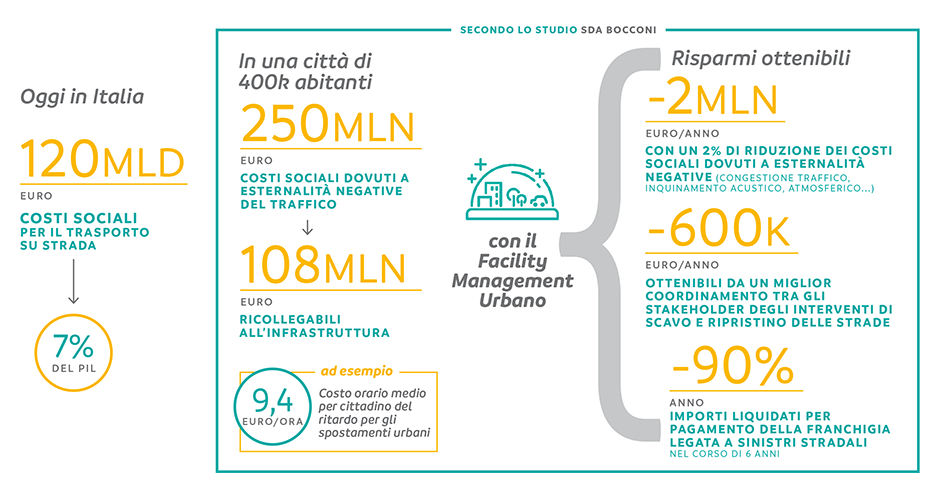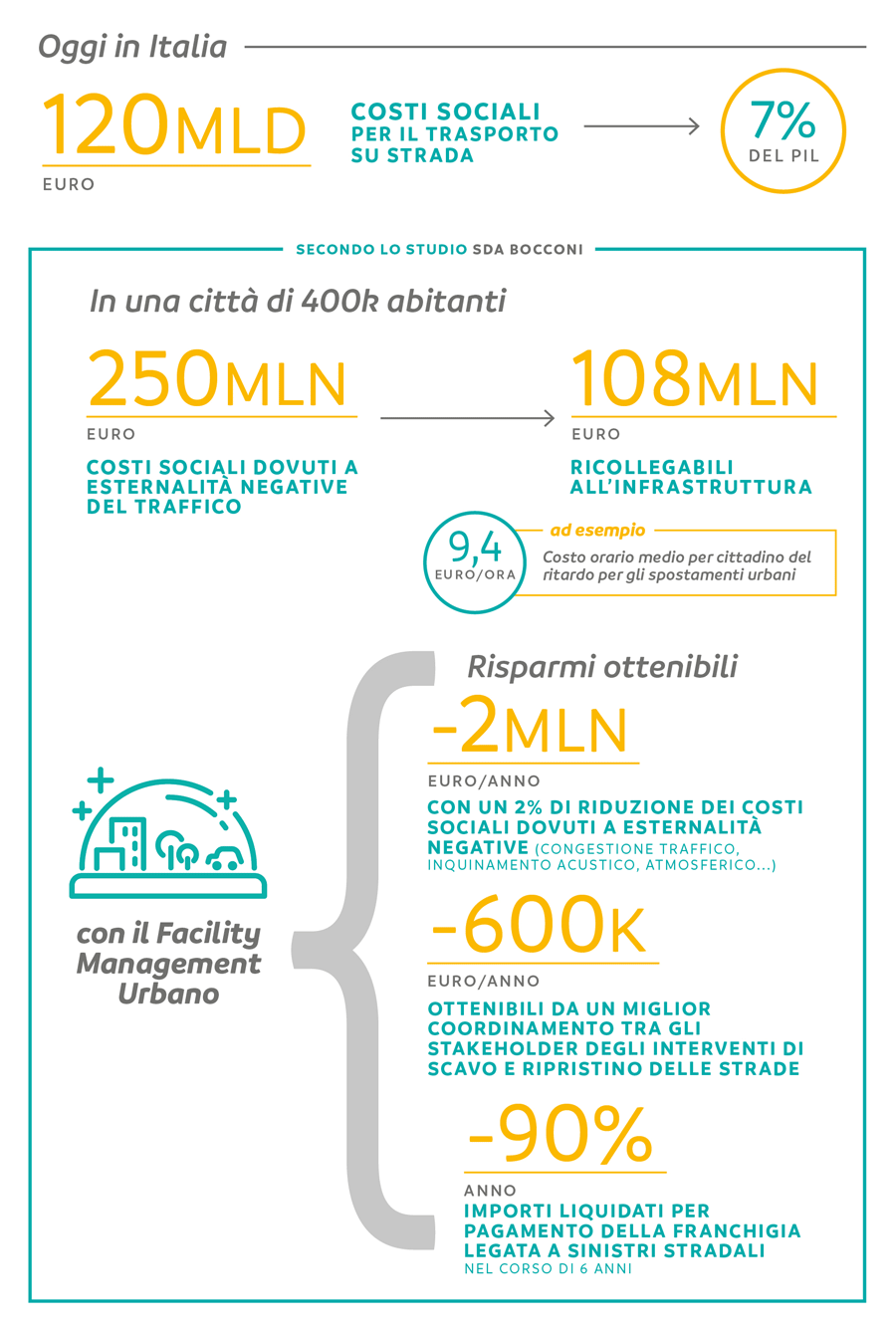
An incontrovertible fact emerges from the 2018 Revision of World Urbanization Prospects, published by the United Nations Department of Social and Economic Affairs: two-thirds of the population of the globe, which will reach 10 billion by 2050, will be packed in urban areas. Cities increasingly drive the world’s economy: by 2025, 65% of global GDP will be generated in the planet’s great urban agglomerations. Dizzy growth that imposes a radical rethinking of the management of services so that everything that is done meets the requirements of promptness, efficacy, safety and general coordination. This is not a Utopia but the need to confute the banal comment that the governance of a city is inevitably destined to be inefficient.
Be “smart” to give city dwellers back their freedom
In our cities nowadays we are used to thinking that liveability is a privilege reserved for few, while we should come back to thinking that it is a right for all. “Smart” means ingenious, intelligent, and Rekeep has maintained for some time that we need to take practical steps towards an efficient city model in which functionality, decorum, modernity and sustainability march in step and in which, for example, digging for the installation of underground services and re-asphalting the road afterwards do not take place without proper coordination, otherwise resources are squandered and the inconvenience for the inhabitants is doubled.
A metropolis must recover a human dimension, it must be a pleasant place to live in, where people can feel safe and move about easily; it must be a place of innovation, with a high level of technology and information.
A metropolis must recover a human dimension, it must be a pleasant place to live in, where people can feel safe and move about easily; it must be a place of innovation, with a high level of technology and information. This is a “revolutionary” but civic goal in the highest and broadest sense of the term, which Rekeep has been working on starting from an analysis of priorities and at the same time of administrative practices in order to attain a perfect balance among the management of city services, the ongoing monitoring of the public’s real day-to-day requirements and coordination with decision makers. Hence the Urban Facility Management model, a driver to enhance the usability of urban spaces by making the most of their potential and employing resources more efficiently.
A story of tradition but also of technological advances
The Urban Facility Management offer prepared by Rekeep is the result of many years of comprehensive research. Our profound experience in delivering services for the community, our constant observation of the manner in which urban environments are evolving and our use of cutting edge technology, all supported by the advent of digitalization, are all factors that have put the Group in a position to frame a methodology and tools whose objective is to improve the efficiency and quality of services and processes. A defining feature of this strategy is close coordination between the company and the Public Authorities in order to ensure that all courses of action are planned with the inhabitants’ real needs in mind and that they are appropriate to these needs, according to the characteristics in terms of territory and town planning of the city and surroundings within whose area Rekeep is to operate. Urban spaces are thereby transformed into “smart” environments that empathize with those who live them from day to day and in which the aim of every change is to make them more functional and practical.
The four guiding principles of change
1
Assist all the persons or entities that have roles to play in the city to improve the quality of medium- and long-term planning and provide integrated services, thus mitigating waste and inconvenience to the inhabitants in a spirit of shared responsibility
2
Use the Big Data gathered by the Smart City constructively, processing useful information to support the Local Authority in reading the city in real time so that it can react to developments more promptly
3
Correct the information misalignment between the Local Authorities and the city dwellers: the “fake problem” perception can be rectified by putting the Local Authorities in a position to give the inhabitants proper information and by stimulating them to keep up to date with current strategies and projects
4
Put inhabitants’ contributions to good use, encouraging them to report matters that are on their minds and to engage in mild forms of control by means of simple, intuitive tools, rewarding positive inputs.
Our services for the integrated management of the city
 Go to the icon and find more details of the services
Go to the icon and find more details of the services
- Maintenance of pavements and signage
- Maintenance of public lighting, traffic light and video surveillance systems
- Event management
- Accident management
- Monitoring the road system
- Traffic management support
- Prevention of flooding
- Winter services
- Maintenance of public parks and gardens
- Fine and tax collection service
High-connectivity system
Every “smart” strategy worth its name draws strength and efficiency from a coordination centre supported by an up-to-date technological and digital infrastructure that conveys, reprocesses and redistributes information in real time so that services are delivered and work is done promptly, in a targeted manner and under continuous control. For this reason, Rekeep’s Urban Facility Management model includes the development of a digital platform that integrates the data from Rekeep itself with other sources (for example the main utility providers), processing them by means of Artificial Intelligence algorithms to make them directly available to the Public Authorities. Through web interfaces that they can consult immediately, the City’s administrators are able to see all the following and more in real time:
- an analysis of the issues discussed by the public
- reports, for example, on the condition of roads, bridges, street furniture, etc.
- the degree of safety of the roads or pollution thresholds
- a database containing all completed and planned maintenance works, including those executed by third-party companies

Urban Facility Management to run the city better
A study conducted for Rekeep by the SDA Bocconi School of Management shows how Urban Facility Management can play a fundamentally important role in rendering cities more sustainable and liveable and contributing notably to the reduction of social costs. The data show that in an average city, the annual social costs caused by negative traffic externalities are estimated as Euro 250 million, at least 108 million of which are related to the quality of the infrastructure. More efficient management with Urban Facility Management would bring a saving of Euro 2 million a year from a reduction in social costs.


Clear and transparent contractual relationship
With Rekeep’s solution the Local Authority can count on clear, effective planning in a medium- to long-term perspective. This helps to reduce waste and enhances the level of coordination and collaboration among all the persons and entities involved in the management of the city’s assets
Rekeep’s Urban Facility Management is based on the contractual formula of concession (PPP, Private-Public Partnership), in accordance with which not only does the Public Authority receive a set of services (road, parks and gardens, lighting, event management, etc.) delivered in an integrated manner by one and the same organization, but also a range of substantial investments at the expense of its partner company, in both technological and digital innovation and also upgrades of infrastructures. All the risks associated with operations, construction and the availability of the asset managed are transferred to the company. In this way, the private partner is stimulated to invest in the efficiency improvement measures that are necessary for it to ensure that the activities entrusted to it are properly performed and also that it obtains a financial return. In general, with Rekeep’s solution the Local Authority can count on clear, effective planning in a medium- to long-term perspective. This helps to reduce waste and enhances the level of coordination and collaboration among all the persons and entities involved in the management of the city’s assets.

Rekeep S.p.a.
Sole-shareholder company
via Poli, 4 - 40069 Zola Predosa (BO) - ph. +39 051.3515111
VAT no./Tax code and Bologna Business Registry no. 02402671206
Share Capital Euro 109.149.600,00 fully paid in
Company subject to management and coordination by MSC Società di Partecipazione tra Lavoratori S.p.A.
